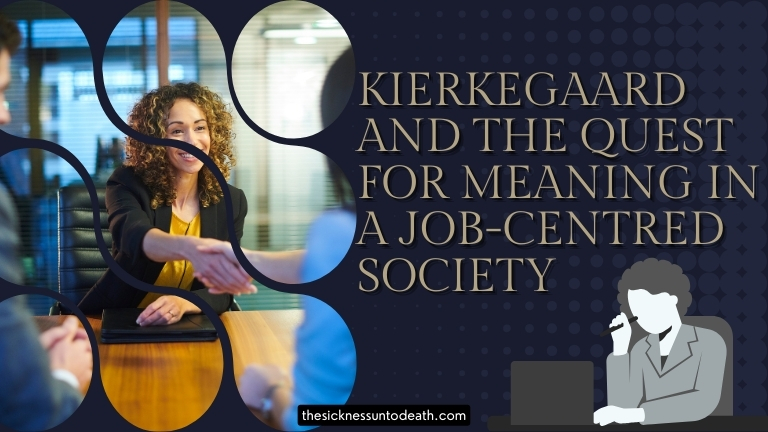“What do you do?”
It’s often the first question we’re asked when we meet someone new—and for many, it’s the hardest to answer.
We live in a world where our job title becomes our identity. Where success is measured in promotions, productivity, and how busy we appear. Somewhere along the way, work stopped being just a part of life—and became the point of it.
But what if that’s not how it’s meant to be?
Søren Kierkegaard, the 19th-century Danish philosopher, believed that true purpose can’t be found in status or salary. In fact, he warned that the more we define ourselves by what we produce, the more likely we are to lose ourselves entirely.
When Your Work Becomes Your Worth
There’s a subtle but powerful message in modern society: You are what you do.
And if you stop doing? You stop mattering.
That mindset might push us to achieve, but it also breeds anxiety, burnout, and despair. Because no matter how hard we work, there’s always someone doing more. Or doing it better.
Kierkegaard would call this a form of despair—the quiet kind that doesn’t shout or sob, but lingers underneath a well-curated LinkedIn profile.
“The greatest hazard of all—losing one’s self—can occur very quietly in the world, as if it were nothing at all.”
The Danger of Career-Centred Identity
Kierkegaard warned against basing your selfhood on anything external—whether that’s a job, a relationship, or public approval. Because all of those things can change, collapse, or disappoint.
If your identity is built on your work, what happens when you lose your job? Retire? Change careers? Burn out?
You’re left wondering, Who am I now?
For Kierkegaard, this kind of crisis isn’t just emotional—it’s spiritual. Because the self isn’t a title or a task list. The self is something you become in relationship with God, not through professional achievement.
Redefining Purpose through Faith
Kierkegaard believed that each of us has a calling—not necessarily to a specific job, but to a life of inward truth, grounded in faith.
That might show up through your career. But it’s not the same thing as your career.
Your true purpose is not to impress, outperform, or outwork others. It’s to live honestly, to grow spiritually, and to become who you were created to be—regardless of job title.
That’s a radically different definition of success. One that isn’t threatened by job loss, redundancy, or stepping off the ladder.
How to Reclaim Meaning in a Work-Obsessed Culture
If you’ve ever felt like your life is reduced to KPIs, calendars, and performance reviews, here’s the good news: you don’t have to live that way.
You are allowed to:
- Find worth beyond your output
- Rest without guilt
- Step off the ladder and still be whole
- Question whether what you’re doing really aligns with who you are becoming
And that questioning? That’s not laziness. It’s courage.
Final Thoughts: Becoming More than a Job Title
Kierkegaard reminds us that our value isn’t measured in hours worked or boxes ticked. It’s found in the quiet space where we ask deeper questions about who we are, why we’re here, and what we’re meant to become.
In a culture obsessed with doing, faith invites us back to being.
To being grounded.
To being present.
To being a self—not a role.
Go Deeper
📖 Visit www.thesicknessuntodeath.com
There, you’ll find a modern, accessible translation of Kierkegaard’s The Sickness Unto Death—a powerful exploration of selfhood, purpose, and the quiet despair that comes when we build our identity on the wrong things.
If you’ve ever wondered, Is this all there is?—this is your invitation to rediscover what truly matters.
You are more than your job.
And your purpose? It’s far deeper than a payslip.

